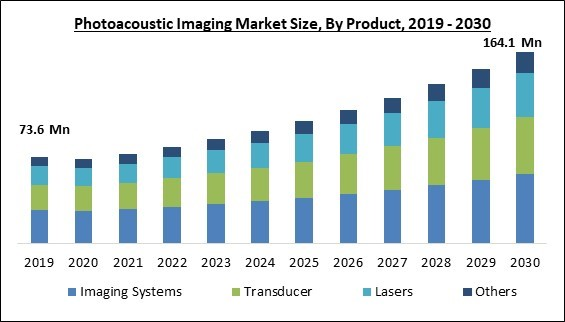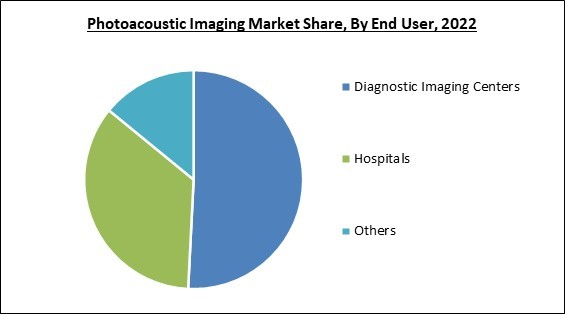Due to the existence of enterprises that produce medical equipment in the area as well as the rising purchasing power of populous nations like China and India, the market in Asia Pacific has grown. Therefore, the Asia Pacific region registered $21,061.4 Thousands revenue in the market in 2022. The adoption of high-tech processing to enhance the manufacturing of imaging systems and the increase in spending on personalized medicine both contribute to the market's expansion. Due to the region's expanding industrial infrastructure, rising disposable incomes, and the presence of well-established domestic companies, Asia-Pacific presents attractive prospects for major players operating in the market. Furthermore, expanding contract manufacturing businesses in the region presents an exciting prospect for entrants. Some of the factors impacting the market are the growing prevalence of chronic illnesses, increasing demand for minimally invasive surgeries, and the high cost of photoacoustic imaging.
Globally, numerous fatal conditions, including cancer, diabetes, and others, are growing more prevalent. According to the WHO, 8.5% of people aged 18 and older had diabetes in 2014. In 2019, diabetes was directly responsible for 1.5 million deaths, and deaths from diabetes accounted for 48% of all deaths in people under the age of 70. Diabetes also caused 460 000 deaths from kidney disease, and 20% of cardiovascular deaths are attributed to high blood glucose levels. Between 2000 and 2019, the age-standardized death rates from diabetes rose by 3%. Diabetes-related deaths surged by 3% in lower-middle-income countries. Medical imaging will likely become more necessary as these chronic diseases become more common. Given this, the market potential would significantly increase with the rising incidence of chronic diseases. Minimally invasive procedures are significantly less frightful than conventional open surgeries. Using typical laparoscopic instruments to perform conventional procedures can be challenging and distressing. Patients may recover more rapidly and with less discomfort following minimally invasive procedures. Minimally invasive surgical procedures are gaining popularity due to their advantages over open surgery, which include shorter hospital stays, improved precision, less pain and scarring, and smaller incisions. Photoacoustic imaging is increasingly being used in minimally invasive surgeries because of these benefits. During the forecast period, this is anticipated to lead to market growth.
However, the development and application of photoacoustic imaging technology may be costly. This may prevent it from being widely used, particularly in healthcare or research where resources are few. Many healthcare organizations, research institutions, and clinics, particularly those with limited budgets, may not be able to afford the initial investment necessary to purchase photoacoustic imaging systems, as well as continuous maintenance and operational expenditures. This restricts the technology's uptake and lowers the pool of possible users. Organizations could choose less expensive options if the price of deploying photoacoustic imaging surpasses the envisioned advantages or possible income creation. Due to this, the high price of photoacoustic imaging could prevent the market from expanding.
Moreover, as a result of the worldwide economic downturn driven by COVID-19 in 2021, the market witnessed a drop. In addition, the COVID-19 pandemic caused disruptions in the supply chain in several end-user industries, including the healthcare industry, industrial manufacturing, and the medical equipment and supplies industry. Despite this, the market showed signs of improvement in post-pandemic era and is expected to demonstrate consistent growth for the market in the years to come. This might be due to the rise in the prevalence of chronic diseases and the rise in knowledge among individuals regarding the need for early diagnosis.
End-user Outlook
On the basis of end user, the market is classified into hospitals, diagnostic imaging centers, and others. In 2022, the hospital segment covered a considerable revenue share in the market. This is because medical infrastructure and facilities have advanced technologically. The demand for early identification and appropriate treatment is rising daily due to an aging population and the rising prevalence of chronic diseases. Hospitals are more acceptable to patients’ needing treatment and care since they are furnished with cutting-edge technical tools, equipment, and skilled professionals.Product Outlook
By product, the market is segmented into imaging systems, lasers, transducer, and others. The laser segment covered a considerable growth rate in the market in 2022. This is because lasers are more expensive but produce results faster and with higher accuracy and precision. Blood oxygenation, hemodynamics, and metabolic activity are just a few of the functional data that laser-based photoacoustic imaging can reveal about tissue. This is useful for comprehending tissue function and detecting anomalies in various medical conditions.Type Outlook
Based on type, the market is fragmented into tomography, and microscopy. In 2022, the tomography segment acquired a substantial revenue share in the market. PAT has the fewest practical limitations on imaging performance and is the most flexible photoacoustic imaging technology. The PAT approach's frame rates, spatial resolution, and detection sensitivity have all been fast improving. Numerous clinical applications for PAT have been suggested, and its use in fundamental biological sciences has significantly increased. Furthermore, PAT is anticipated to have more effective applications in clinical practice and biomedical research because of its singular combination of the optical absorption contrast and scaling of the depth and resolution of ultrasonic imaging.Regional Outlook
Region wise, the market is analyzed across North America, Europe, Asia Pacific, and LAMEA. The North America region led the market by generating the highest revenue share in 2022. The growing importance of maintaining a healthy lifestyle among individuals and the ongoing increase in the elderly population are two factors contributing to the surge in demand for photoacoustic imaging systems. Further factors projected to boost market expansion include the presence of a widely recognized healthcare infrastructure, substantial purchasing power, and a surge in the adoption rate of advanced photoacoustic imaging.The market research report covers the analysis of key stakeholders of the market. Key companies profiled in the report include Fujifilm Holdings Corporation, Advantest Corporation, Prexion Corporation, Seno Medical Instruments, Inc., illumiSonics, Inc., OPOTEK LLC, EKSLPA (EKSMA Group), Verasonics, Inc., Photosound Technologies, Inc., iThera Medical GmbH.
Scope of the Study
By Product
- Imaging Systems
- Transducer
- Lasers
- Others
By End-user
- Diagnostic Imaging Centers
- Hospitals
- Others
By Type
- Microscopy
- Tomography
By Geography
- North America
- US
- Canada
- Mexico
- Rest of North America
- Europe
- Germany
- UK
- France
- Russia
- Spain
- Italy
- Rest of Europe
- Asia Pacific
- China
- Japan
- India
- South Korea
- Singapore
- Malaysia
- Rest of Asia Pacific
- LAMEA
- Brazil
- Argentina
- UAE
- Saudi Arabia
- South Africa
- Nigeria
- Rest of LAMEA
Key Market Players
List of Companies Profiled in the Report:
- Fujifilm Holdings Corporation
- Advantest Corporation
- Prexion Corporation
- Seno Medical Instruments, Inc.
- illumiSonics, Inc.
- OPOTEK LLC, EKSLPA (EKSMA Group)
- Verasonics, Inc.
- Photosound Technologies, Inc.
- iThera Medical GmbH
Unique Offerings
- Exhaustive coverage
- The highest number of Market tables and figures
- Subscription-based model available
- Guaranteed best price
- Assured post sales research support with 10% customization free
Table of Contents
Companies Mentioned
- Fujifilm Holdings Corporation
- Advantest Corporation
- Prexion Corporation
- Seno Medical Instruments, Inc.
- illumiSonics, Inc.
- OPOTEK LLC, EKSLPA (EKSMA Group)
- Verasonics, Inc.
- Photosound Technologies, Inc.
- iThera Medical GmbH










